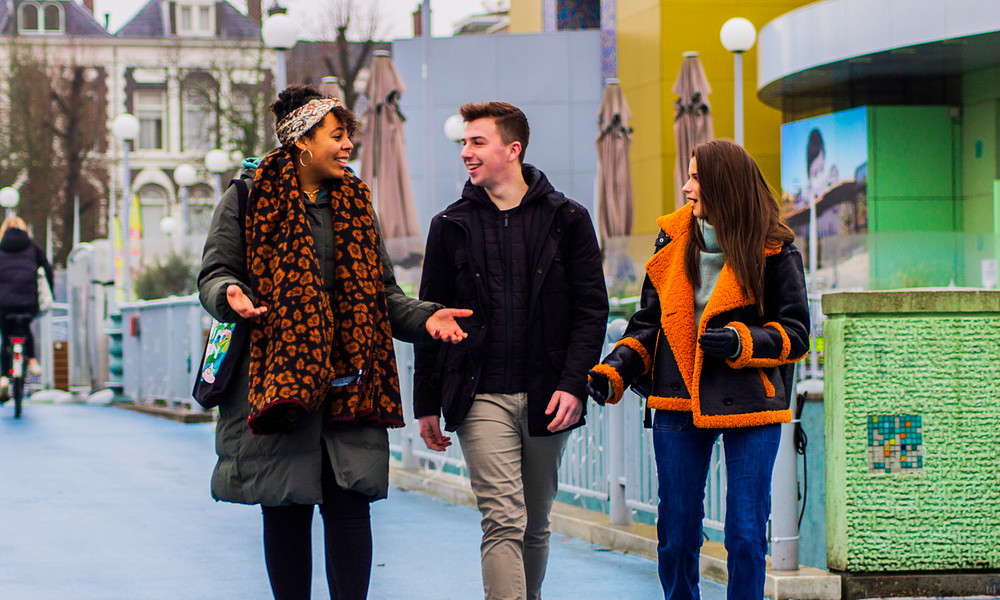Universities of applied sciences agree to limit and balance intake of international students
- News

On behalf of all universities of applied sciences (UAS), the Association of Universities of Applied Sciences (Vereniging Hogescholen) presented a proposal for self-management of the intake of international students to the Ministry of Education, Culture and Science (OCW). Maurice Limmen, chairman of the Association of Universities of Applied Sciences, said: 'The number of international students in universities of applied sciences is limited and in balance, to maintain this balance in the future we are now taking measures. This way we strengthen the advantages of internationalisation and limit the disadvantages. With this proposal, universities of applied sciences want to manage the number of international students and a targeted intake."
Minister Dijkgraaf (OCW) had requested the sector for this proposal. The proposal for self-direction of universities of applied sciences is closely related to the current bill on internationalisation in balance (WIB) that the government is working on. The aim of this bill is to develop instruments that will strengthen the benefits of internationalisation and mitigate its drawbacks. UAS understand that too large an influx of international students leads to concerns in society, for instance about pressure on student accommodation. However, unbridled growth in the number of international students is not an issue within UAS: the share of international students in the bachelor's phase in UAS has been stable for years at around 8-9% of the total number of students. The share of Dutch undergraduate students in UAS is thus greater than 90%.
The aforementioned agreements made with the other universities of applied sciences are in line with developments already going on at Hanze. Hanze aims to keep the number of international students stable, but to increase the number of students in sectors with shortages, in our case mainly the technical programmes. We focus on information and guidance rather than recruitment. We do this mainly by talking to prospective students, providing clear and honest information on accommodation, career opportunities in the region, etc. We focus our information mainly on courses in sectors with shortages and choose targeted fairs.
The universities of applied sciences will jointly create offers of Dutch language skills courses, which students can take voluntarily. The Hanze is considering taking this a step further: the ambition is to make basic Dutch language proficiency compulsory in the first years of the bachelor's degree. In addition, the higher levels of Dutch language proficiency training will be offered to those students who want to stay here in the northern region. Furthermore, the Hanze will also focus more on integration and career advice for our international students. In this, we will of course continue to cooperate with Make it in the North: www.makeitinthenorth.nl.
We will strongly advise our international staff to follow a Dutch language training. But if a teacher does not need the training to perform his/her duties, we will obviously not oblige. Together with the RUG, we will also continue to take joint responsibility in the coming years when it comes to housing international students. In this, we work together with the Municipality of Groningen, Groninger Student Association, ESN and the housing corporations. This cooperation, which has been in place since 2018, has led, among other things, to the realisation of the construction of 400 student houses on the Zernike Campus. During the peak period at the beginning of the academic year, these housing units can be double-occupied, temporarily accommodating 800 students.
Universities of applied sciences see great added value in a balanced intake of international students. In a number of sectors and in many regions, there is a specific need for talent to fill shortages on the labour market, for instance. In this way, international students can benefit the Dutch economy and society. Universities of applied sciences want to increase the contribution of foreign graduates to the labour market even more by working on language training and increasing the chance of staying.
Most of the professions for which UAS educates are Dutch-speaking, such as nursing and teaching, the programmes for these sectors are and will therefore remain Dutch-speaking. The vast majority of UAS courses can therefore be taken in Dutch (93%). In fact, 80% of the study programmes can only be followed in Dutch. Only courses for sectors that by definition work in an international context, such as hotel schools and the aviation sector, tend to be foreign-language.
In the self-direction proposal, the universities of applied sciences agree on a whole number of measures to cushion the negative effects of internationalisation, by means of binding agreements. For example, universities of applied sciences agree to steer towards a cap on the number of students to be enrolled in foreign-language programmes for the economic programmes, at the level of the average intake of the past three years. To this end, universities of applied sciences ask the government to enable the instrument of the numerus fixus for these programmes, so that they can also use this instrument when the number of intakes of first-year students is too high.
Universities of applied sciences will further actively seek solutions to housing problems related to the influx of international students together with municipalities and student housing providers. There will also be an effort to improve the mastery of the Dutch language by offering Dutch language lessons to both Dutch and international students and international staff. The full list of proposed measures can be read in the letter to Minister Dijkgraaf (OCW).
How satisfied are you with the information on this page?